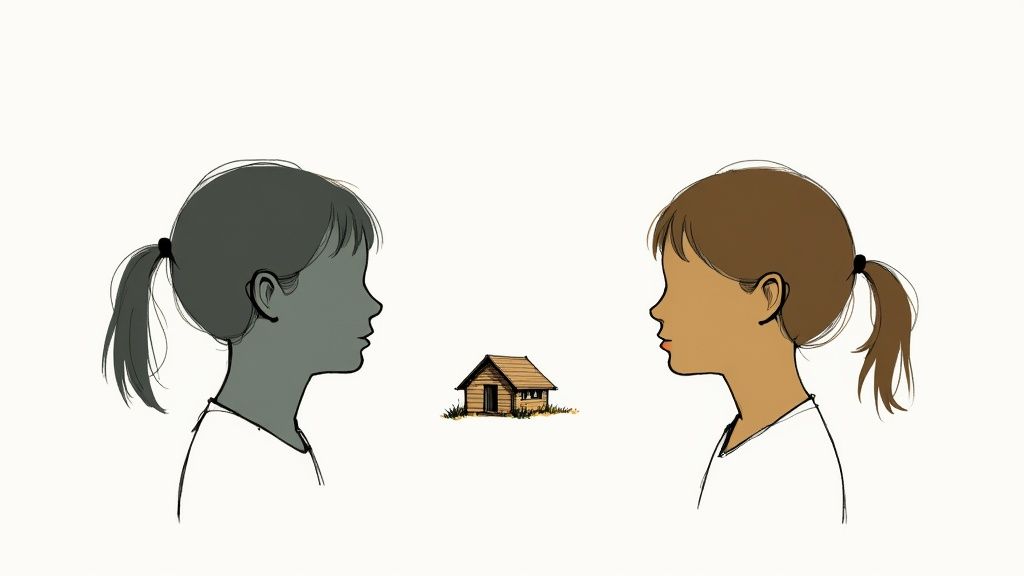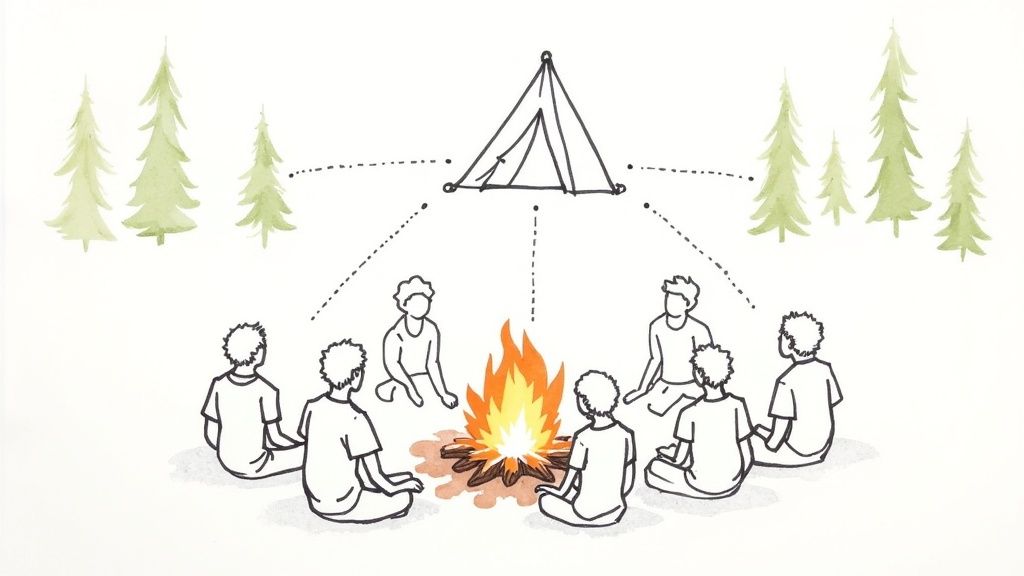Summer camp is more than just a place; it's a transformative experience filled with first friendships, newfound independence, and unforgettable adventures. For young readers, books about summer camp offer a way to relive that magic, prepare for their own journey, or simply escape into a world of bonfires, bunk beds, and lifelong bonds.
From classic tales of reunited twins to contemporary stories of overcoming homesickness and even spooky mysteries under the stars, these narratives capture the essence of what makes camp so special. They explore themes of personal growth, resilience, and the power of friendship in a unique, self-contained world where kids are in charge. This curated list dives into seven exceptional middle grade and YA books that bring the camp experience to life, providing detailed insights to help you, your family, or your students find the perfect literary escape.
We'll explore why each book stands out, its key themes, and who it will appeal to most, ensuring you can match the right story to the right reader. Whether you're searching for a heartwarming tale of connection, a thrilling mystery, or a humorous adventure, this guide will help you discover the best books about summer camp for your reading list.
1. The Parent Trap by Erich Kästner
Long before the iconic Disney films, there was Das doppelte Lottchen, a heartfelt 1949 German novel that has become the blueprint for one of the most classic summer camp tropes. Erich Kästner’s story introduces readers to Lisa Palfy and Lottie Horn, two girls who look identical and meet for the first time at a summer camp in the Austrian mountains. Their initial rivalry soon blossoms into a powerful friendship as they discover they are twin sisters separated at birth by their divorced parents.

This book is a must-read for anyone who loves stories about summer camp, as it masterfully uses the setting as a catalyst for life-altering discovery. The camp isn't just a backdrop; it’s the magical space where Lisa and Lottie can uncover their shared identity and hatch their famous plan to switch places, all away from the watchful eyes of their parents.
Why It Stands Out
What makes this book a timeless classic is its sensitive exploration of complex family dynamics from a child's perspective. Kästner addresses the emotional impact of divorce with a gentle, hopeful touch that still resonates today. It’s a powerful story about identity, resilience, and the unbreakable bond of family. The narrative demonstrates how the temporary community of a summer camp can provide the perfect environment for self-discovery and a bit of mischievous, life-changing scheming.
How to Get the Most Out of This Book
- Read Before Watching: Encourage young readers to experience the original story before seeing the popular film adaptations starring Hayley Mills (1961) or Lindsay Lohan (1998). This allows them to form their own vision of the characters and setting.
- Discuss Key Themes: Use the book as a springboard to talk about themes like identity, the meaning of family, and the ethics of the twins' secret-keeping. It provides a safe, fictional context to explore these real-world topics.
- Introduce International Literature: As a celebrated German novel, The Parent Trap is an excellent and accessible entry point into international children's literature, showing that powerful stories know no borders.
2. Camp Confidential Series by Melissa J. Morgan
For readers who want to fully immerse themselves in the world of summer camp, Melissa J. Morgan's Camp Confidential series offers an extensive and beloved collection of stories. Spanning over 25 books, this series takes readers to Camp Lakeview, where a rotating cast of characters navigates the highs and lows of bunk life. Each novel focuses on a different girl, exploring her unique personality, friendships, and personal challenges against the vibrant backdrop of camp activities.

This series is a cornerstone among books about summer camp because it provides a realistic, long-form look at the entire experience. From the first-day jitters and homesickness to the excitement of color wars and the drama of cabin rivalries, the books capture the authentic rhythm of camp life. The interconnected stories build a rich, continuous world that makes readers feel like they are returning to Camp Lakeview summer after summer.
Why It Stands Out
What makes the Camp Confidential series so enduring is its ability to tackle relatable middle-school issues with honesty and heart. The books address friendship dynamics, crushes, self-esteem, and learning to fit in, all within the safe and structured environment of camp. By featuring a different protagonist in each book, the series provides multiple perspectives, ensuring that nearly every reader can find a character to connect with. This approach celebrates individuality while emphasizing the power of community.
How to Get the Most Out of This Book
- Prepare First-Time Campers: The series is an excellent tool for easing the anxieties of a child heading to camp for the first time. The stories normalize common fears and show how challenges can be overcome with the help of friends.
- Start from the Beginning: While each book can stand alone, reading the series in order allows readers to appreciate the evolving relationships and character cameos that make the Camp Lakeview world feel so real and connected.
- Engage Reluctant Readers: With fast-paced plots and accessible language, these books are perfect for reluctant readers. For more titles that engage this age group, check out this guide to top books for 6th graders.
3. Bunks by Lois Ruby
Lois Ruby’s Bunks captures the quintessential summer camp experience with a humorous and heartfelt story about two unlikely roommates at Camp Wildwood. The novel introduces readers to Nikki, who is outgoing and excited for camp, and Elizabeth, who is studious, reserved, and would rather be anywhere else. Thrown together as bunkmates, their clashing personalities create the perfect setup for conflict, comedy, and eventual connection.
This character-driven novel is one of the essential books about summer camp because it authentically portrays the social dynamics of bunk life. The camp environment serves as a microcosm of the real world, forcing Nikki and Elizabeth to navigate homesickness, camp-wide competitions, and messy pranks. It is their shared space and experiences that push them beyond their initial judgments to discover the value of acceptance and friendship.
Why It Stands Out
What makes Bunks a memorable read is its realistic exploration of personal growth and the challenges of forming friendships. Ruby doesn't shy away from the awkwardness and anxieties that many kids feel when thrown into a new social setting. The narrative is a reassuring and relatable look at how stepping outside one's comfort zone, even reluctantly, can lead to unexpected personal discoveries and lasting bonds. It’s a testament to how the shared adventures of camp can foster empathy and understanding between even the most different people.
How to Get the Most Out of This Book
- Perfect for Pre-Camp Reading: This is an excellent book for kids who are nervous about attending camp for the first time, as it shows that making friends can take time and that it's okay to be different.
- Discuss Character Perspectives: Encourage a conversation about why Nikki and Elizabeth initially dislike each other. This can be a great way to explore themes of first impressions, empathy, and what it means to be a good friend.
- Explore More Great Reads: For readers who enjoy stories centered on compelling characters and dynamic relationships, Bunks is a great starting point. After finishing, you can explore other fantastic character-driven stories by browsing lists of the best book series for kids.
4. Sleepaway Girls by Jen Calonita
For any reader who has ever felt like an outsider, Sleepaway Girls offers a warm and relatable story about finding your place. Jen Calonita’s novel introduces Sam, a 12-year-old city girl who is less than thrilled about being sent to her first-ever sleepaway camp. Initially resistant and homesick, Sam navigates the overwhelming new world of camp traditions, unfamiliar activities, and the tricky social landscape of cabin life.
This book is an essential read for anyone preparing for their first summer away from home, as it perfectly captures the anxieties and triumphs of a first-time camper. The camp setting is not just a location but a character in itself, shaping Sam’s journey as she slowly opens up, builds unexpected friendships, and discovers a side of herself she never knew existed. It’s a heartfelt tribute to the transformative power of the camp experience.
Why It Stands Out
What makes Sleepaway Girls so effective is its authentic portrayal of the modern camp experience from a newbie's perspective. Calonita expertly depicts the initial awkwardness, the challenge of making friends, and the ultimate joy of becoming part of a community. The story validates the feelings of nervous first-timers while showing that facing your fears can lead to incredible rewards. It has become a staple on pre-camp reading lists recommended by both librarians and camp directors.
How to Get the Most Out of This Book
- Perfect for First-Time Campers: This is an ideal book to give a child who is feeling anxious about attending summer camp. Sam’s journey provides a comforting and realistic preview of what to expect, from homesickness to fun.
- Discuss Expectations vs. Reality: Use Sam’s experiences to start a conversation about what camp is really like. Talk about how it's okay to feel out of place at first and discuss healthy ways to cope with new social situations.
- Explore Character Growth: Trace Sam's development from a reluctant, homesick girl to a confident camper who has found her tribe. This offers a powerful lesson in resilience, adaptability, and the importance of giving new experiences a chance.
5. The Great Brain at the Academy by John D. Fitzgerald
While set in a boarding school rather than a traditional summer camp, this installment in John D. Fitzgerald's classic series captures the essence of a camp experience through its focus on independence, camaraderie, and youthful problem-solving. Set in 1898, the story follows the mischievous and brilliant Tom "The Great Brain" Fitzgerald, who is sent to a strict Catholic academy in Salt Lake City. Away from his family, Tom must rely on his wits to navigate new social structures, outsmart bullies, and, of course, turn a profit.
This book earns its place among the best books about summer camp by exploring what happens when a clever kid is placed in a new, self-contained community. The academy functions as a stand-in for camp, providing a rich environment for Tom's elaborate schemes and personal growth. Readers watch as he learns important lessons about fairness, friendship, and the consequences of his actions, all within the unique microcosm of the school.
Why It Stands Out
What makes The Great Brain at the Academy so memorable is its perfect blend of historical fiction, humor, and morality. Fitzgerald doesn't shy away from complex themes like religious intolerance, bullying, and justice, but he presents them through Tom's pragmatic and often hilarious schemes. It’s a story that champions intellect and ingenuity while subtly teaching the importance of empathy and using one's talents for good. The book shows that the "camp" experience of finding your place among peers is a universal one.
How to Get the Most Out of This Book
- Discuss Historical Context: Use the book's late 19th-century Utah setting as an opportunity to discuss the time period. Talk about the historical details, such as the social attitudes and technology mentioned, to enrich the reading experience.
- Compare and Contrast Settings: Encourage readers to compare the academy with a modern summer camp. What elements are similar (making friends, structured activities, distance from parents) and what are different? This fosters critical thinking about the story's themes.
- Explore Moral Dilemmas: Tom's schemes are often ethically gray. Use these scenarios as a springboard to discuss topics like fairness, whether the ends justify the means, and the difference between being smart and being wise.
6. Welcome to Camp Nightmare by R.L. Stine
For readers who prefer their summer camp stories with a side of suspense, R.L. Stine’s Welcome to Camp Nightmare is an absolute classic. This installment in the iconic Goosebumps series takes the familiar setting of a rustic summer camp, Camp Nightmoon, and twists it into a thrilling and spooky adventure. The story follows young Billy, who quickly realizes that his summer destination is anything but ordinary as fellow campers disappear, strange creatures lurk in the woods, and the camp counselors seem dangerously indifferent to it all.

This is one of the essential books about summer camp for those who enjoy a good scare. Stine masterfully builds a sense of dread and isolation, using the camp's remote location to amplify the horror. Instead of heartwarming friendships, readers get heart-pounding suspense, making it a standout title that has introduced countless young readers to the horror genre, including a memorable adaptation in the Goosebumps TV series.
Why It Stands Out
What makes this book so effective is its brilliant use of misdirection and its unforgettable twist ending, a hallmark of the Goosebumps series. Stine subverts every comforting summer camp trope, turning activities like hiking and bunking with friends into sources of terror. The narrative plays on common childhood fears of being far from home and not being believed by adults. It's more than just a scary story; it's a cleverly constructed puzzle that keeps readers guessing until the final page.
How to Get the Most Out of This Book
- Perfect for Reluctant Readers: The fast-paced plot and high-stakes suspense make this an excellent choice for engaging readers who might be intimidated by denser novels.
- Discuss the Horror Genre: Use the book as an opportunity to talk about the elements of suspense and horror. Discuss how the author creates a scary atmosphere and what makes the final twist so surprising. While a fun read, its journey of isolation and self-reliance can be compared to themes in some of the best coming-of-age novels.
- Gauge Comfort Levels: Before recommending, it’s wise to consider a child's comfort level with scary content. While tame by adult standards, Goosebumps is designed to be spooky for its target audience.
7. Holes by Louis Sachar
While not a traditional summer camp, the setting of Louis Sachar’s Newbery Medal-winning novel offers a powerful, unconventional take on the genre. Holes introduces readers to Stanley Yelnats, a boy wrongly convicted of a crime and sent to Camp Green Lake, a brutal juvenile detention facility. Here, under the scorching Texas sun, boys are forced to dig a hole five feet deep and five feet wide every single day, a task the warden claims builds character but secretly serves a much different purpose.

This book is an essential read for those looking for books about summer camp that break the mold. The camp setting is not a place of fun and games but one of punishment and mystery. Yet, amidst the hardship, themes of deep friendship, resilience, and fate emerge as Stanley forges an unlikely bond with his fellow camper, Zero. Sachar masterfully weaves together three different storylines across time to solve the puzzle of Camp Green Lake.
Why It Stands Out
What makes Holes an unforgettable classic is its brilliant narrative structure and its exploration of justice, destiny, and redemption. The desolate, oppressive environment of the camp becomes a crucible that tests the characters' spirits and reveals their true strength. It subverts the cheerful camp trope to tell a gripping, complex story about how history, family curses, and personal choices intersect. The friendships formed are not born from shared fun but from shared struggle, making them incredibly powerful.
How to Get the Most Out of This Book
- Explore Narrative Structure: Pay attention to how the author connects the past with the present. Discuss how the historical flashbacks to Kissin' Kate Barlow and Stanley's "no-good-dirty-rotten-pig-stealing-great-great-grandfather" contribute to the main plot.
- Compare Camp Experiences: Use the book to start a conversation comparing Camp Green Lake to a traditional summer camp. What elements are similar, like forming friendships, and what elements are starkly different? This can lead to a deeper appreciation for the story's unique setting.
- Discuss Justice and Friendship: Holes provides a perfect opportunity to discuss themes of fairness, false accusations, and the true meaning of friendship. Analyze the bond between Stanley and Zero and how they support each other to overcome adversity.
7-Book Summer Camp Comparison
| Title | Implementation Complexity 🔄 | Resource Requirements ⚡ | Expected Outcomes 📊 | Ideal Use Cases 💡 | Key Advantages ⭐ |
|---|---|---|---|---|---|
| The Parent Trap by Erich Kästner | Moderate: Single novel with complex themes | Low: One book, minimal supplementary needed | Strong emotional impact on family & identity themes | Introducing classic camp stories; cultural discussions | Timeless appeal; original source of popular adaptations |
| Camp Confidential Series by Melissa J. Morgan | High: Multi-book series with ongoing continuity | Moderate to high: Multiple volumes to access | Long-term engagement with realistic camp life portrayal | Reluctant readers; camp preparation; friendship growth | Diverse characters; realistic camp dynamics; extensive series |
| Bunks by Lois Ruby | Moderate: Standalone novel with emotional depth | Low: Single book | Balance of humor and social issues; empathy development | Discussing friendship, acceptance; middle school reading | Genuine camp atmosphere; strong character focus |
| Sleepaway Girls by Jen Calonita | Moderate: Standalone novel, contemporary setting | Low: Single book | Relatable newcomer camp experience; emotional growth | First-time campers; addressing homesickness | Contemporary language; realistic camp traditions |
| The Great Brain at the Academy by John D. Fitzgerald | Moderate: Part of series, historical setting | Low to moderate: Series familiarity helps | Educational with humor; personal growth in boarding camp | Bridging historical and camp fiction; humor in learning | Engaging protagonist; educational historical context |
| Welcome to Camp Nightmare by R.L. Stine | Low: Single book, simple horror plot | Low: One book, fast-paced reading | Suspense and horror enjoyment within camp setting | Reluctant readers into horror; Halloween themes | Unique twist on camp stories; popular series backing |
| Holes by Louis Sachar | High: Complex multi-layered narrative | Moderate: Single but dense novel | Deep exploration of justice, friendship, and growth | School curricula; thematic discussions on adversity | Award-winning; multilayered storytelling; strong themes |
Finding Your Next Adventure in the Pages of a Book
The journey through these seven distinct books about summer camp has revealed one undeniable truth: camp is more than just a place. It is a transformative experience, a microcosm of life where friendships are forged in the heat of a campfire, independence is discovered far from home, and personal growth happens in the most unexpected ways. Whether your young reader is eagerly packing their trunk or prefers their adventures confined to the imagination, the stories we have explored offer a powerful passport to this unique world.
We have seen how a camp setting can serve as the perfect catalyst for change. In classics like The Parent Trap, camp provides the unlikely backdrop for separated twins to reclaim their family. In modern tales like Sleepaway Girls, it becomes a space to navigate complex friendships and first crushes. Even in unconventional camps, like the terrifying Camp Nightmoon in Welcome to Camp Nightmare or the punishing Camp Green Lake in Holes, the setting forces characters to rely on their wits, courage, and the bonds they form with others to survive and thrive.
Key Takeaways from Our Campfire Stories
The true magic of books about summer camp lies in their ability to mirror the real-life lessons learned during those fleeting summer months. Here are the core themes that resonate across these diverse titles:
- The Power of Friendship: From sharing secrets in a cabin to relying on a friend to face a spooky legend or an unjust system, these books consistently highlight that friendship is the cornerstone of the camp experience.
- Embracing Independence: Away from parents and the familiar comforts of home, characters from Lois Ruby's Bunks to John D. Fitzgerald's The Great Brain at the Academy must learn to solve problems, make decisions, and trust their own instincts.
- Discovering Your True Self: Camp is a crucible for identity. It offers a fresh start where kids can break out of old molds, try new things, and discover hidden strengths and passions, a journey central to many of these narratives.
These stories serve as more than just entertainment. They are valuable tools for parents, educators, and young readers. Use them to start conversations about what to expect at camp, to ease pre-camp anxiety, or simply to share in the nostalgic joy of a summer adventure. Each book on this list provides a different window into the challenges and triumphs that define growing up. By exploring these narratives, young readers can gain empathy, build resilience, and see that they, too, have the strength to be the hero of their own story, whether it's at a real-life summer camp or within the pages of a book. The next great adventure is always just a chapter away.
At Number 6 Publishing, we are dedicated to discovering and amplifying the kinds of unique, heartfelt stories that empower young readers, much like the unforgettable books about summer camp featured here. We champion underdog authors who write with authenticity and heart, creating the next generation of beloved classics. Explore our catalog of compelling middle grade and YA titles at Number 6 Publishing and find your next favorite read.
